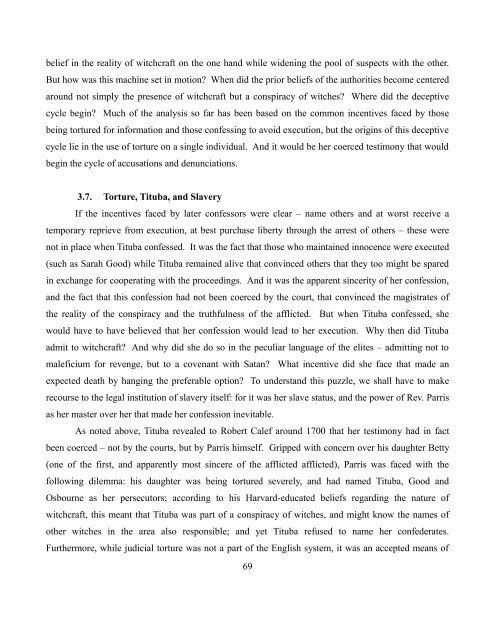The Torturer's Dilemma: Analyzing the Logic of Torture for Information
The Torturer's Dilemma: Analyzing the Logic of Torture for Information
The Torturer's Dilemma: Analyzing the Logic of Torture for Information
You also want an ePaper? Increase the reach of your titles
YUMPU automatically turns print PDFs into web optimized ePapers that Google loves.
elief in <strong>the</strong> reality <strong>of</strong> witchcraft on <strong>the</strong> one hand while widening <strong>the</strong> pool <strong>of</strong> suspects with <strong>the</strong> o<strong>the</strong>r.<br />
But how was this machine set in motion? When did <strong>the</strong> prior beliefs <strong>of</strong> <strong>the</strong> authorities become centered<br />
around not simply <strong>the</strong> presence <strong>of</strong> witchcraft but a conspiracy <strong>of</strong> witches? Where did <strong>the</strong> deceptive<br />
cycle begin? Much <strong>of</strong> <strong>the</strong> analysis so far has been based on <strong>the</strong> common incentives faced by those<br />
being tortured <strong>for</strong> in<strong>for</strong>mation and those confessing to avoid execution, but <strong>the</strong> origins <strong>of</strong> this deceptive<br />
cycle lie in <strong>the</strong> use <strong>of</strong> torture on a single individual. And it would be her coerced testimony that would<br />
begin <strong>the</strong> cycle <strong>of</strong> accusations and denunciations.<br />
3.7. <strong>Torture</strong>, Tituba, and Slavery<br />
If <strong>the</strong> incentives faced by later confessors were clear – name o<strong>the</strong>rs and at worst receive a<br />
temporary reprieve from execution, at best purchase liberty through <strong>the</strong> arrest <strong>of</strong> o<strong>the</strong>rs – <strong>the</strong>se were<br />
not in place when Tituba confessed. It was <strong>the</strong> fact that those who maintained innocence were executed<br />
(such as Sarah Good) while Tituba remained alive that convinced o<strong>the</strong>rs that <strong>the</strong>y too might be spared<br />
in exchange <strong>for</strong> cooperating with <strong>the</strong> proceedings. And it was <strong>the</strong> apparent sincerity <strong>of</strong> her confession,<br />
and <strong>the</strong> fact that this confession had not been coerced by <strong>the</strong> court, that convinced <strong>the</strong> magistrates <strong>of</strong><br />
<strong>the</strong> reality <strong>of</strong> <strong>the</strong> conspiracy and <strong>the</strong> truthfulness <strong>of</strong> <strong>the</strong> afflicted. But when Tituba confessed, she<br />
would have to have believed that her confession would lead to her execution. Why <strong>the</strong>n did Tituba<br />
admit to witchcraft? And why did she do so in <strong>the</strong> peculiar language <strong>of</strong> <strong>the</strong> elites – admitting not to<br />
maleficium <strong>for</strong> revenge, but to a covenant with Satan? What incentive did she face that made an<br />
expected death by hanging <strong>the</strong> preferable option? To understand this puzzle, we shall have to make<br />
recourse to <strong>the</strong> legal institution <strong>of</strong> slavery itself: <strong>for</strong> it was her slave status, and <strong>the</strong> power <strong>of</strong> Rev. Parris<br />
as her master over her that made her confession inevitable.<br />
As noted above, Tituba revealed to Robert Calef around 1700 that her testimony had in fact<br />
been coerced – not by <strong>the</strong> courts, but by Parris himself. Gripped with concern over his daughter Betty<br />
(one <strong>of</strong> <strong>the</strong> first, and apparently most sincere <strong>of</strong> <strong>the</strong> afflicted afflicted), Parris was faced with <strong>the</strong><br />
following dilemma: his daughter was being tortured severely, and had named Tituba, Good and<br />
Osbourne as her persecutors; according to his Harvard-educated beliefs regarding <strong>the</strong> nature <strong>of</strong><br />
witchcraft, this meant that Tituba was part <strong>of</strong> a conspiracy <strong>of</strong> witches, and might know <strong>the</strong> names <strong>of</strong><br />
o<strong>the</strong>r witches in <strong>the</strong> area also responsible; and yet Tituba refused to name her confederates.<br />
Fur<strong>the</strong>rmore, while judicial torture was not a part <strong>of</strong> <strong>the</strong> English system, it was an accepted means <strong>of</strong><br />
69
















